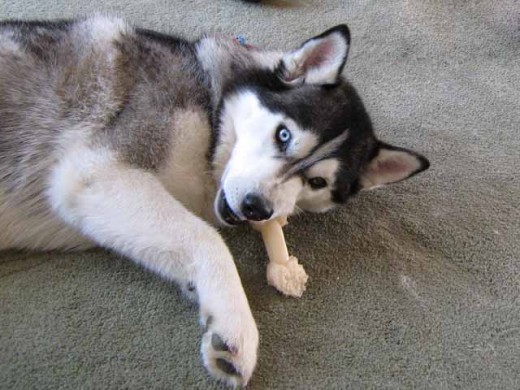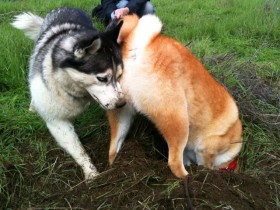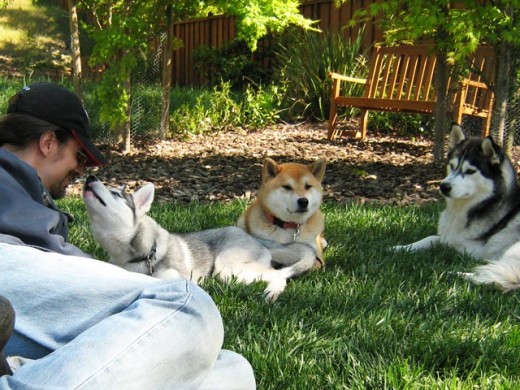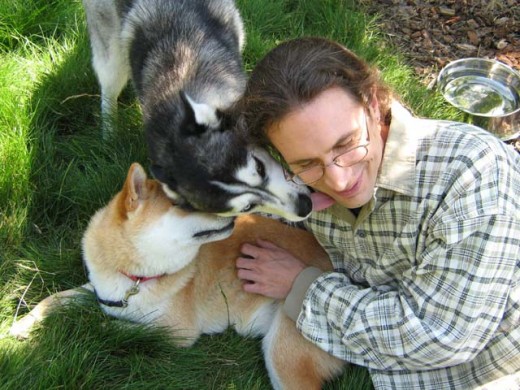I got this interesting comment from Andrew on my What is Dog Cruelty article –
Question: what is dog cruelty?
Answer: the domestication of dogs is cruel.
What do you think?
- Is the domestication of dogs cruel?
- Should dogs be left in the wild?
- Are wild dogs happier than domestic dogs?
Let us consider how our companion dogs have fared in contrast to their wild, non-domesticated brothers and sisters – the gray wolves.

Wolf vs. Dog

Gray wolves have been on and off the endangered species list since 1974. Arguments have been made over what constitutes a safe wolf population size – whether it should be 300 wolves or 2000-2500 wolves.
In contrast, based on the U.S. Pet Ownership & Demographics Sourcebook (2007 Edition), there are more than 72 million pet dogs in the U.S.
Clearly, from a survivability standpoint, dogs have done much better than wolves.
Some argue however, that population numbers alone do not indicate good quality of life. After all, some of the most populous countries have a relatively low standard of living for the majority of its citizens.
Therefore, what factors contribute most to a dog’s quality of life?
Dog Quality of Life
Here are some of the key factors that contribute to a dog’s quality of life. If I am missing any, please let me know.
- Food.
- Shelter.
- Health.
- Freedom to roam, dig, roll in skunk sauce, and other favorite dog activities.
- Pack companionship.
- Physical and mental activity.
For a quality of life comparison, let us consider each of these factors for domestic dogs and non-domestic or wild dogs (e.g. dingoes).
Should Dogs Be Left in the Wild 1 – Food and Shelter

Food and shelter.
Domestic dogs often get as much food as they want, fed to them on a silver platter.
Non-domestic dogs must work hard for their food, often traveling long distances to look for prey. Sometimes, they may go hungry for days at a time if no prey can be found.
As we encroach more and more upon the natural habitats of wolves and wild dogs, it will become difficult for them to find proper food sources and shelter.
Indeed, we should be better stewards to the wild life on this planet, and protect more of their natural ecosystems. However, human encroachment is a fact of life that all wild animals must contend with.
In terms of food and shelter, domestic dogs win out because they are provided with both. Animal laws do at least state that owners must provide their dogs with adequate food and shelter.
Should Dogs Be Left in the Wild 2 – Health
Wild dogs do not have any special health-care, aside from what they can provide to each other. On the other hand, domestic dogs are properly vaccinated against dangerous diseases (e.g. rabies, lyme disease) and can receive help and medication for allergies, joint issues, skin parasites, and much more.
As a result, domestic dogs usually have better health and live longer lives than wild dogs.
Some may say that wild dogs do not need to deal with as many human introduced health hazards, such as cars and over-feeding. That is true, but most serious health issues are faced by all dogs, including heartworm, rabies, lyme disease, and cancer.

Should Dogs Be Left in the Wild 3 – Freedom to roam, dig, and roll in skunk sauce

Freedom to dig.
Clearly wild dogs have more freedom. They need not live in a house and are free to migrate over long distances in search for food. They may dig wherever, and roll in whatever that suits their fancy. However, unlike domestic dogs, much of their time will be taken up by the search for food.
Domestic dogs live in fixed locations (houses or apartments), and often have many rules placed upon them. Many are not allowed to dig at all, and certainly rolling in skunk sauce is a big no-no. Constraints may be placed on where they can walk, how fast they walk, what they can smell, where and when they can pee, what they can eat, and much more.
As far as freedom goes, wild dogs get a much better deal than their domestic counterparts.

Should Dogs Be Left in the Wild 4 – Pack companionship

Pack companionship.
Wild dogs often live in packs and hunt in packs. A pack is helpful for survival and provides its members with companionship from their own kind.
Domestic dogs live with a human pack. In multi-dog households, they have both human and dog companionship.
However, dog owners are frequently busy and may be away for most of the day. As a result, domestic dogs may spend most of their lives chained in the yard, or left home-alone to bark at shadows.
In terms of pack companionship, domestic dogs that do receive good quality time with their pack (human and dog), have it best. They have the leisure time to enjoy the company of their family, and get to engage in a larger variety of activity and play.
On the other hand, wild dogs probably have it better than dogs that are left alone, in an empty house, for most of the day.
Sadly, it is likely that a greater number of domestic dogs fall into the latter group.

Should Dogs Be Left in the Wild 5 – Physical and mental activity
Wild dogs get physical and mental exercise every day by necessity – during the hunt for food.
Domestic dogs usually get food presented to them in a bowl, and will require other forms of physical and mental exercise. There are a variety of fun ways to exercise a dog including –
- Neighborhood walks and hikes at the park or beach.
- Dog obedience training sessions.
- Fun dog games such as flirt pole, fetch, and soccer.
- Dog sports such as agility, disc dog, fly-ball, and lure coursing.
- Fun interactive dog toys.
- Supervised play sessions with other friendly dogs.
A domestic dog that gets a good mix of these activities every day has it better than a wild dog. However, dogs that are not exercised and walked regularly, will have a lower quality of life.

Is the Domestication of Dogs Cruel?
When I started writing this article – I did not think so.
My intent was to state the pros and cons, then clearly show that domestic dogs have a better life than wild dogs. However, after writing this article, the results are not clear at all.
Andrew makes a good point.
It is probable that many domestic dogs have a lower quality of life than wild dogs. Luckily, there are also a fair number of domestic dogs that enjoy a very good life with their human family; one that is filled with understanding, joint activity, and a lot of pack companionship.
In the end, the question of quality of life for a domestic dog comes down to us – how we treat our dogs, and what laws we enact to protect them. It can be a great life for a dog, if we care to attend to their very simple needs.
Dogs are pack animals and need to spend time with their family. They also need exercise and positive outlets for their doggy-energy. That is why it is most important to consider our current time commitments and constraints before getting a dog.

Dogs and other animal should live free. Animals need to be together ,need to have babies ,need to live in nature and have their natural life. Having short or long life is not important .It is important that they Have their natural life .A dog or a cat in an appartment is not able to have mating ,reproduction and ….. It is not fair .It is cruel.
Its really irrelevant. Humans have taken over the entire earth and overpopulation will eventually destroy even us. There is no room for any animals let alone dogs. We kill anything that comes into our space witch is almost every square inch of real estate. Thank god dogs only live 10 to 15 years because 90% of our animals wake up to the same never ending day, staring out of the window waiting for there 5 minute walk, and thats from a good owner.
no
I definitely agree a lot of dogs that are domesticated are in a type of slavery. But all domesticated dogs are not in slavery. If you have a good relationship with a dog built on love trust and respect I can assure you there is nothing slavery about it. My dog is free to come and go as he please. And I can assure you the only place he really wants to be is with me.
Completely agree with you John! I live in a rural area and my dog actually found me. She is free to run around wherever she pleases. Most of the time she’s in front of the house, laying out by the sun. Sometimes she’ll run after a squirrel or with 2 other neighbor’s dogs. I’ll let her out whenever she goes to the door, let her back inside when I hear her bark. If she’s outside for a while and it’s getting dark, she always comes back around dusk. It’s her choice to come back. She’s very polite. She knows she has to be polite to get food, water, shelter, etc. She poops in the woods, like she knows it’s rude to poop by the house and we’ve never had an accident with her. In my opinion she has the best of both worlds!
A good article touching on many of good points, but leaning away from the one clear fact that is right in front of us. Domestication of any animal or creature is slavery. Even if the quality of life as we see it appears better it is not our choice to make how animals should live. The worst part is that we domesticate animals for the most selfish and shallow reasons ( that dog looks cute, those fish would look great in my apt, I’m lonely, it’s a good conversation starter, nobody else has one). It is true that releasing domesticated animals would result in many of their deaths but that is only because we have domesticated them in the first place. Nature has it’s way and there will always be the predator and the prey. Humans however are obsessed with controlling everything, nature will retain it’s balance as long as we do not try and control it. Freeing animals from our control would be an extreme measure but ideally the right thing to do.
I honestly feel that dogs 50lbs + should not be domesticated and should require an exotic pet license to have in home. They are just too dangerous and have hurt/killed to many people randomly. I’m not a dog hater however, why keep something in society that can possibly harm someone in a dangerous way. When dogs attack usualy it is randomly and without warning and usualy from “good dogs” that “dont bite”. I’ve read countless stories of joggers, babys, small children, elderly and people just being in the wrong place wrong time badly injured or killed by dogs without being provoked. Dog lovers will say “Its not the dogs fault”. So yes I feel that dogs 50lbs+ should be placed in zoos, national parks, etc etc however not allowed into society. The level of danger is too great. Either that or the cops should do a better job at enforcing dog leash laws and harsher penalties should be enforced on dog owners that dont keep there dogs on leash or dont keep there dogs properly secured.
What’s really funny, is that there have been mass amounts of humans killing other human beings, and not only that, having the capability of torturing them.
Large dogs are usually actually quite gentle. Any aggression is usually related to fear, surprise or upbringing. Similar to a human beings reason for aggression, but luckily cannot contain the sociopathic pleasure of harming other people that some humans have.
I disagree. If a dog attacks someone its the owners fault. But it rarley happens. Just because some dogs attack doesn’t mean you take them all away. If a person in your family killed someone is it fair for the whole family to be put in jail. If we couldn’t own them there would be a lot of dog deaths. They cant live on their own and all rescues would die. If we couldn’t own dogs over 50 pounds my dog would of died she was found at a drug house and would of died if we didnt take her. She is well trained and would never hert anybody if it wasn’t for her own protection. She is a boxer so she is extremely friendly and even when she is playing wont bite or chew. She is naughty and eats shoes. When my small dog was being attacked she stepped in and tackled the other dog and still didnt bite. Just protected her best dog friend.
Pet dogs cannot live in the wild because most small breeds of dogs would be able to survive long expeshaily in the winter and with all the other domestic animals that will probably think that they will be a good lunch. But bigger breeds would probably survive longer and be able to catch a prey they would not have to freeze to death because of their big fur coat and because that they are so big. For both big and small breeds it is hard to find food.
Im cailey
Shibashake,
I must begin by commending you on your even and fair attitude. It is most welcome and appreciated. We need more of this today.
I find your comparison to raising children interesting. However, in raising children the intent is guidance/nurturing with the goal of the child graduating,so to speak, into free thinking adulthood and then no longer needing the guidance nurturing. With a domesticated lesser living organism, the domestication , is a creation defined by the higher organism, and as such (domestication) has no place in a respectful society. We need not define child rearing as domestication.I contend, that by domesticating, we have abused the true intent of any species. Additionally, stray is a man created concept. After all, we do not consider all of those pigeons in the park stray.
All very good points.
1. True-intent of a species.
Is it the true-intent of wolves to be with their own and not interact with people? Is it indeed the true intent of all animals to simply mix with their own and only interact with others while hunting for food? Or is somehow true-intent inclusive of everything within Nature but excluding ourselves? Why is that? We are part of Nature too.
In terms of dogs and indeed most other animals, human contact is a fact of life. And through this human contact, they are changed forever. Even the pigeons are changed.
As you point out, they are changed according to our needs and our rules. For better or for worse, that is just how it is today and it will only get more extreme as our population keeps growing. It is simply not possible for animals to remain truly wild/untouched.
True intent implies that there is an absolute right/wrong to World Order. This gets into the purview of religions, and ultimately rests on each individual’s belief system.
2. Nature’s Way vs. Our Way
There are many differences between Nature’s way and our way but one is not necessarily better than the other. I would submit that modern medicine, advanced construction, and food cultivation all have some very big pluses. Dogs derive benefit from all of these things that are not available to their wolf brothers.
Nature usually selects based on strength, whereas we have other selection methods for dogs. But it is not clear to me that one is more right than the other.
3. Dog Breeding Program
One of the more problematic areas when it comes to the domestication of dogs rests in our breeding programs. There is no denying that we take away the reproductive freedoms of the dog population. Many are spayed and neutered, and those who are not are usually bred according to our rules and selection criteria.
Such a breeding program would certainly be considered barbaric if applied to people.
However, Nature is not more kind. Wolves are not allowed to freely breed with each other either. It is only the alpha pair that gets to breed. Furthermore, the male alpha gets to select the female from his pack. The female can either submit or fight. Other wolves in the pack still have their physical drives intact but are not allowed to act on those drives. This system does not seem less barbaric to me.
4. Free Thinking Adulthood
Dogs *do* think for themselves.
Depending on training techniques and owner, some dogs may be strongly encouraged/forced to follow orders and not think for themselves. However, that is a function of the owner and the training methods used.
There are always rules and restrictions that we must all live by. When we live with others in a family or pack, there will be more rules that we must follow, but there are also good rewards.
Some dogs escape and run away from their homes. Some dogs choose to stay with their human families because they want to. And some dogs stay with their human families because the have to and can’t conceive of anything else.
I do not think that the domestication of dogs is cruel but it can certainly be implemented in a cruel way.
5. Related Stuff
Have you read the Uplift books by David Brin? It is fiction but it deals with a really interesting concept – that of uplifting a species to self-awareness. In this way, the higher organism is still creating a new species as defined by them, but there are some big rewards associated with the process.
It is a very interesting series which deals with many of the moral issues surrounding this extreme domestication process, how such a thing can be easily abused, and what kind of World/Universe would result from it.
There was also a very interesting study on domesticating silver foxes and the effects the process had on their behavior, morphology, and physiology.
http://scienceblogs.com/thoughtfulanimal/2010/06/monday_pets_the_russian_fox_st.php
What is keeping another human on a leash, deciding when and how much and what they may eat called? How then about an animal of lesser inelegance than ours?
Hello James,
Those are very interesting questions.
I think that it is very easy for us to treat our dogs as slaves because as you point out, we control all of the dog’s resources and freedoms. Thus we can easily abuse our position.
It is similar with children – we also control their resources and freedom, and can easily abuse our position as parent or guardian. However, most people care for their children very well and only limit freedoms and resources when it comes to health and safety.
Are our children our slaves? They can certainly be treated as such, but most of us do not do so. Similarly, I think many people treat their dogs well.
Finally, it is also important to consider the alternatives. Stray dogs may have more freedoms but they have a very tough life. Wolves are hunted, losing their habitats, and are often on the endangered species list.
It is a difficult and complex issue … with few clear answers.
This is a very interesting article. I would say that food is a toss-up. Wolves and coyotes get to hunt down rabbits, deer, moose, bison, and all that good stuff. Domestic dogs have kibble that is guaranteed to be there twice a day, but low quality kibble is filled with corn, wheat, soy, and all sorts of junk that dogs don’t need. Not to mention, most dogs aren’t terribly thrilled by kibble. Feral dogs eat human trash which is usually pretty bad for them, but probably pretty tasty.
Wolves and coyotes may starve to death if there is no prey to hunt, but the pure act of hunting and eating a freshly killed deer is many times healthier (and more exhilarating, I would think) than anything our domestic dogs experience.
Hey Nicco,
Good to see you. How is your little guy?
Yeah – to some extent depending on breed. My Sibe loves to hunt. She gets to hunt the earth critters that come out in our yard but I think she prefers to eat her regular food.
When she is hungry, she will even work for kibble. 🙂 I think even kibble starts to look really good when one has not eaten in a while.
I saw this documentary about wolves not too long ago and it was a bit sad at times. The family just had cubs, and there was no food around. As a result, the male had to go far away from their den to look while the female stayed home, and stayed hungry for many days. It is a tough life.
He’s good and I’m good too. The idea that dog training is about training the human can’t be any truer. I’m learning something new everyday, and I feel like I still have so much to learn. It’s exciting how much there is to learn. I’m not looking forward to the day when my training plateaus.
I saw that documentary you’re talking about. The father wolf had traveled hundreds of miles looking for food, only to come up empty. The cub was malnourished because the mother couldn’t produce any milk. It made me want to drop a bison herd in there for them.
By the way, your shiba has a ginormous head.
LOL – I felt the same way. Then, later on I saw another documentary on the migration of buffalo or some such, and it’s a hard life for them too. Nature ain’t the kindest Mistress.
That is so strange. I was just saying last week that I thought his head was on the small side in proportion to this body! 😀 Two things I think account for this –
1. His head seems bigger or smaller depending on how much fur his body has. When he has a thick coat, his head looks small, but once he blows his coat, his head looks much larger in proportion to his now smaller looking body.
2. He is always doing all kinds of weird, funny poses and I am probably not using the best camera angles.
🙂 Always fun to see you Nicco. Glad to hear that you and your pack are doing well.